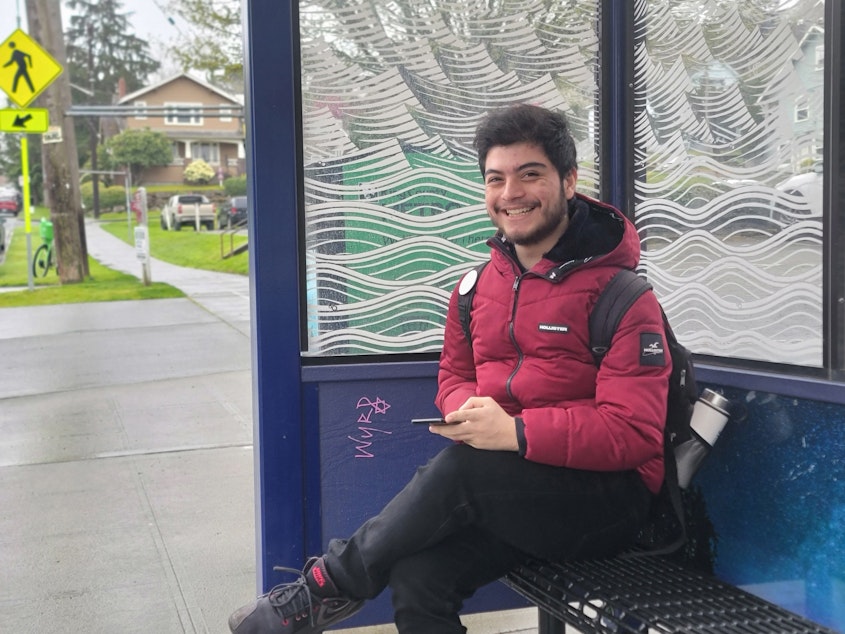Public transit is now free for King County youth. But what happens when you turn 19?

Last fall, King County Metro and many other Washington transit agencies made fares free for youth 18 and under.
Fabian Hernandez-Angel is one of the young people who uses this program to get to and from school. But he’s turning 19 soon, meaning he’ll no longer be eligible for the program. RadioActive's Colin Yuen has more.
[RadioActive Youth Media is KUOW's radio journalism and audio storytelling program for young people. This story was entirely youth-produced, from the writing to the audio editing.]
F
abian Hernandez-Angel is a freshman at Seattle Pacific University. Every weekday he takes the bus from his home in Auburn to his school in Seattle’s Queen Anne neighborhood.
The round trip is about four hours. But Hernandez-Angel doesn’t mind the wait. In fact, he’s loved the freedom of public transit since he started using it back in high school.
“For me, [getting a Youth ORCA card] felt like how people describe getting their first car. It felt like getting a key to the world,” Hernandez-Angel said. “I was able to finally explore all these places in Seattle, and it made me feel more connected with the communities that I usually just pass through.”
Sponsored
Hernandez-Angel commutes a lot, but it's for a good reason. His dream is to study computer science and pursue a career in game development.
“I derive a lot of motivation from my younger years in elementary [school], being excited going home to play some games," he said. "And I really want to bring those experiences to kids in the future.”
When Hernandez-Angel was offered admission to Seattle Pacific University's computer science program, there were real financial concerns that his family had to consider.
“We were an apartment of like seven people, so money had to be juggled between all of these different places,” he said. “So during the summer, I worked at a warehouse for around three months. And that made just enough for me to afford my first year at SPU.”
Sponsored
And thanks to the Move Ahead Washington package, Hernandez-Angel hasn’t had to pay a bus fare on top of school.
Sound Transit representative John Gallagher said this is exactly what the package is for. Gallagher said the biggest win of providing free rides to youth is knowing that it connects them to more opportunities.
For Hernandez-Angel, it has connected him to his education.
Hernandez-Angel mainly rides King County Metro, and they allowed free rides when he began college at 18. But he’s turning 19 soon, and he’ll have to start paying out of pocket. It's a challenge he’s preparing to face.
“Right now, the only money I have left in my checking on average is this allowance my mom's able to afford me of like $100,” he said. “But that's mainly dedicated towards food, since after all the commuting, I get hungry. And early in the year, I've already been trying to skip meals to save a bit of cash.”
Sponsored
Hernandez-Angel said that he “would not be able to go to Seattle Pacific University" if the costs pile up too much.
"I don't see it as being at all realistic to stay if I can't even make it to the campus,” he said.
Hernandez-Angel has considered a couple of options. He thought about a part-time job, but most of his time is spent in school and on the bus. And a car is just way too expensive. There’s his university's discounted bus pass, but it’s around $90 a month, which would swallow his budget.
So what did Hernandez-Angel decide once he turned 19?
Hernandez-Angel learned about another transit fare program, the reduced-price ORCA LIFT program, which is made for riders who are part of low-income households.
“Since it's just $1 per ride, that’s going to be significantly less than I'd end up paying in normal fare prices," he said.
Sponsored
Even with the ORCA LIFT program, Hernandez-Angel plans to work a summer job to help cover transit and other school costs.
The future is still uncertain, but, he says, he’s remaining hopeful.
“Because if you're able to be happy, even in circumstances that are conventionally seen as some of the worst-case scenarios, you're pretty good,” he said.
Hernandez-Angel has been able to find his way. And luckily, he’ll be able to continue riding the bus on the journey toward his education.
This story was produced in a RadioActive Youth Media Advanced Producers workshop for high school and college-age youth. Production assistance by Antonio Nevarez. Edited by Mary Heisey. Prepared for the web by Simone St. Pierre Nelson.
Sponsored
Find RadioActive on Instagram, TikTok, YouTube and Facebook, and on the RadioActive podcast.
Support for KUOW's RadioActive comes from the Bill & Melinda Gates Foundation Discovery Center and BECU.



